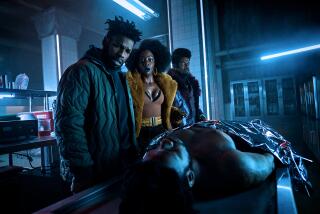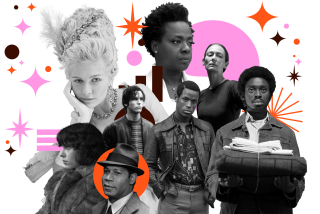‘Django Unchained’ a brazen, bloody spectacle, critics say
- Share via
With “Django Unchained,” writer-director Quentin Tarantino has once again turned history on its head to carry out an audacious revenge fantasy. Whereas “Inglourious Basterds” imagined retribution against Hitler and the Nazis, “Django Unchained” — a Southern-fried take on the spaghetti Western — sets its sights on antebellum slaveholders.
As might be expected of Tarantino, the resulting film is bloody and profane — and according to many critics, quite effective.
The Times’ own Betsy Sharkey writes that “Django” is Tarantino’s “most articulate, intriguing, provoking, appalling, hilarious, exhilarating, scathing and downright entertaining film yet.” The director, Sharkey says, “has never seemed more comfortable in the saddle.”
PHOTOS: ‘Django Unchained’ - Quentin Tarantino, Jamie Foxx, Christoph Waltz
Sharkey also commends supporting actors Christoph Waltz, who plays the German bounty hunter Dr. King Schultz (one of the good guys), and Leonardo DiCaprio, who plays the plantation owner Calvin Candie (a very bad guy). Sharkey’s only real gripe is that Tarantino can’t bear to wrap things up, and so the film runs long: “there are a couple of spots when you are sure you’ve just witnessed a bang-up ending only to find Tarantino setting things up for another round.”
Mick LaSalle of the San Francisco Chronicle gives the film a rave review, and in fact finds the length just right. “‘Django Unchained’ is the most consistently entertaining movie of 2012,” he writes. “It’s 165 minutes long and shouldn’t be a minute shorter, a film of surprises, both in story and in casting, and of moments of agonizing, teased-out tension.”
Tarantino, LaSalle says, “has found that elusive spot that all artists strive for, complete spontaneity and absolute control.”
“Django Unchained” also seems to have made an impression on the Boston Globe’s Wesley Morris, who writes, “I’ve never seen anything like this movie, not in one 165-minute sitting, not from a single director, not made with this much conscientious bravado and unrelenting tastelessness — this much exclamatory kitsch — on a subject as loaded, gruesome, and dishonorable as American slavery.”
Amid all the pyrotechnics and bloodshed — the movie is “absurdly violent” — Morris says Jamie Foxx pulls off the difficult lead role, an ex-slave trying to rescue his wife: “Django is the moral and emotional core of this movie, the human force that keeps the whole thing from sliding into kitsch.”
Stephanie Zacharek, writing for NPR, says the film is “by turns exhilarating, hilarious, horrifying and poetic.” She adds, “[Tarantino’s] aim, it seems, is to both provoke and delight — he’s firing on all cylinders here. The picture is a rousing good time, but there are strong threads of anger in it too. Like the Spaghetti Westerns and ‘70s blaxploitation pictures from which it takes its cues, it’s a form of kicking and screaming against social injustice.”
The New York Times’ A.O. Scott also finds “Django Unchained” to be both rollicking and thought-provoking. He writes, “It is digressive, jokey, giddily brutal and ferociously profane. But it is also a troubling and important movie about slavery and racism.”
The film, Scott says, contains “Tarantino’s trademark dialogue-heavy, suspense-filled set pieces” as well as “moments of pure silliness.” But there’s more: “When you wipe away the blood and the anarchic humor, what you see in ‘Django Unchained’ is moral disgust with slavery, instinctive sympathy for the underdog and an affirmation (in the relationship between Django and Schultz) of what used to be called brotherhood.”
The reviews haven’t been unanimously positive, however. Slate’s Dana Stevens writes that the film “provoked a lot of contradictory feelings in me, including some that don’t usually come in pairs: Hilarity and boredom. Aesthetic delight and physical nausea. Fist-pumping righteousness and vague moral unease.”
She adds, “Tarantino’s intent may have been to showcase the horrors of slavery, but there’s something about his directorial delectation in all these acts of racial violence that left me not just physically but morally queasy.”
ALSO:
Oscar 8-Ball: Quentin Tarantino’s ‘Django Unchained’
‘Django Unchained’: Quentin Tarantino tells a slave tale
‘Django Unchained’ photos: Quentin Tarantino, Jamie Foxx, Christoph Waltz
PHOTOS AND MORE
VIDEO: The making of ‘Argo,’ ‘Les Miz’ and more
VIDEO: Holiday movies - A video guide
PHOTOS: NC-17 movies: Ratings explained
More to Read
The biggest entertainment stories
Get our big stories about Hollywood, film, television, music, arts, culture and more right in your inbox as soon as they publish.
You may occasionally receive promotional content from the Los Angeles Times.










